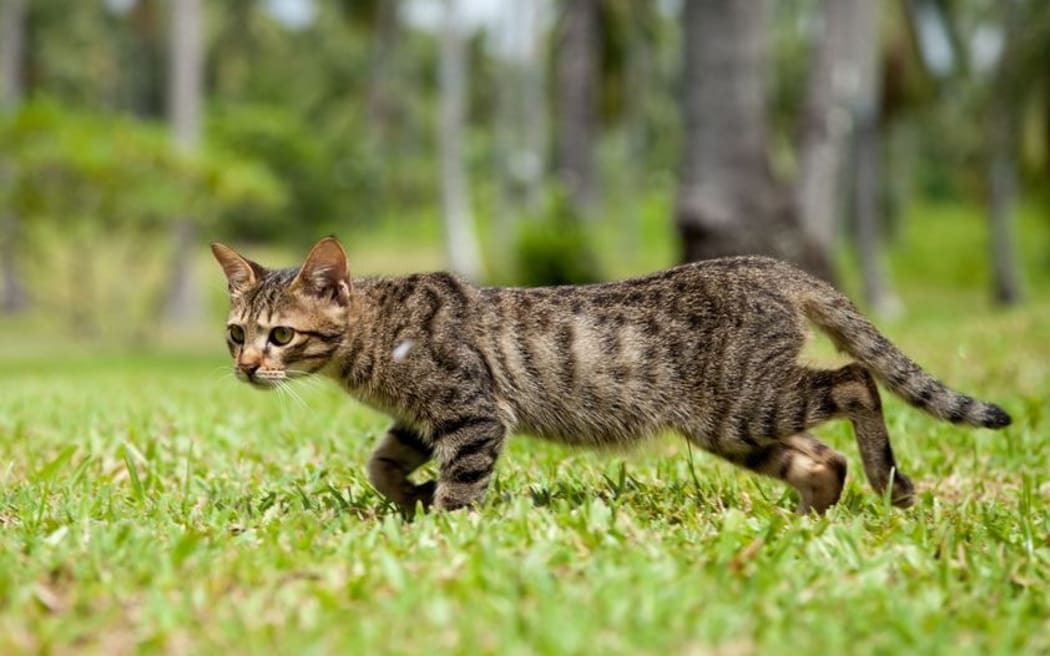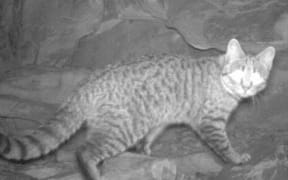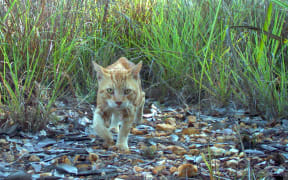
Photo: 123RF
A controversial feral cat killing competition is to go ahead this weekend - with organisers saying $5 for every kill will be donated to charity.
The North Canterbury Hunting Competition, which raises money for Rotherham School, courted controversy earlier this year by encouraging children to shoot feral cats.
It backed down and removed the children's category.
Now, the club has clarified rules for hunting feral cats, including the requirement for box traps and a minimum of .22-calibre rifles to be used in killing the animals.
The National Conservation Trust would be given $5 for every cat killed.
Animal rights group SAFE had come out against the competition and Christchurch Animal Save was planning a protest for the competition's weigh-in.
But competition organiser Mat Bailey said rural communities had a massive problem with feral cats they had been included in the competition for the first time this year to raise awareness of the damage they did to native species.
"The first time around we had it in the kids section and we were caught off guard - we didn't realise it was going to go so worldwide," Bailey said.
"But this time around we've got rules in place that hunters need to follow ... cats need to be box-trapped so you can make correct identification and most of the hunting is going to be out the back of farms, these guys are going to go around and set some traps while they're out the back there and take care of some of these animals."
The donation to the National Conservation Trust would be used for its education in schools programme as organisers believed people needed to be made aware of the issue feral cats presented, Bailey said.
"We always knew we were going to get a bit of backlash but it seems to be more from the animal lovers society, not necessarily cat owners in general.
"I think a responsible cat owner will have no issues here because we are well away from them and if they are responsible and worried about it, they'll look after their cat and make sure it's not going to end up somewhere it shouldn't be."
Rules also included hunting only between Friday and Sunday, communicating with farmers and neighbouring properties to get permission to hunt feral cats and to only target areas which were a minimum 10 kilometres from residential and lifestyle zones.
"We've said in the rules, if in doubt - if you do think it's a domestic cat and you're unsure, then don't kill it. Let it go," Bailey said.
SAFE raises concerns
But SAFE spokesperson Will Appelbe said there was still a significant risk someone's pet could be killed.
"I highly doubt these people will be carrying microchip scanners to identify these cats. Even if they did have scanners, they may not be able to use them. Companion cats can act feral when they're trapped in a cage, making identification very difficult," Appelbe said.
"At the end of the day, there is little-to-no difference in the physical appearance of feral, stray and pet cats.
"There are far more effective strategies to protect native wildlife from cats, like mandatory desexing, registration and microchipping. We also need more funding for rescue and adoption programmes.
"Indiscriminately killing cats considered feral and wild is inherently cruel and not a realistic solution."
The problem with feral cats
Bailey said hunters would not be carrying microchip scanners, but it was readily apparent if cats were feral.
"No, we won't be carrying microchip scanners - I don't think there's any point, really.
"Where these animals are going to be getting trapped, it's well away from the towns or lifestyle blocks, it'll be out the back of nowhere."
Bailey said even SAFE suggested animals should be desexed and microchipped but many were not.
"Out here in the countryside, we're getting cats dumped on side roads and these are flowing into our farms. They're carrying diseases, they're killing people's chickens, they're fighting our domestic cats, so things need to change.
"Something needs to come into play to stop that overflow out into our wildlife then it goes off-farm into the bush and look at the damage they're doing there."
When RNZ initially reported on the hunting competition, Boffa Miskell biosecurity consultant Dr Helen Blackie, who studied feral cats for two decades, said they were responsible for killing up to 100 million birds in Aotearoa each year.
"Historically, we know that feral cats were responsible for the extinction of six bird species and are leading agents of decline in populations of birds, bats, frogs and lizards."
Feral cat numbers had exploded in the last decade, Blackie said. In some areas, where pests were tracked by camera, more feral cats were detected than possums.
But wild felines are not monitored, controlled or culled in Canterbury because they are not classified as pests under its regional pest management plan.
"We don't have the same toolbox for controlling cats as we do for other species such as rats, possums and mustelids and there isn't such widespread accepted control strategies, which is something that we need to work on particularly across our conservation estate," Blackie said.
Feral cats also carry toxoplasmosis, a significant cause of abortion in sheep.
Blackie said a study of the impact of the parasitic infection on the sheep industry in Hawke's Bay was estimated at $18 million in 2014.
"It's a very emotive issue, and it is an area where we are probably lagging behind the rest of the world now in terms of acknowledging the damage that's being done by feral cats and the methods we need to use to control them."
The competition will take place from Friday, 23 June until Sunday, 25 June. There will also be prizes for deer, pigs, chamois, ducks, geese, possums, hare, rabbits, stoats, ferrets, weasels and rats.




